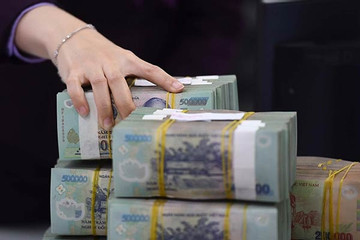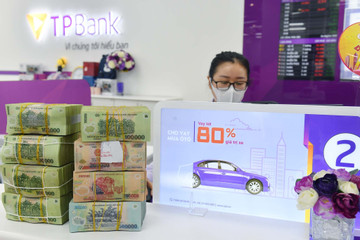- © Copyright of Vietnamnet Global.
- Tel: 024 3772 7988 Fax: (024) 37722734
- Email: [email protected]
vietnam's monetary market
Update news vietnam's monetary market
Foreign exchange rate forecast to be under control in 2024
In 2024, production will gradually recover so imports will likely grow a bit faster than exports, but in general, the overall balance will still help Vietnam take the initiative to regulate the VND/USD exchange rates.
Central bank to pump VND2 quadrillion into VN economy in 2024
The State Bank of Vietnam (SBV) forecast that nearly VND2 quadrillion would be pumped into the national economy in 2024 to support economic recovery if the 15% credit growth target is met.
Banks have money but businesses lack capital
By the end of November, credit had grown by 9.15 percent compared with late 2022, far below the targeted 14-15 percent set earlier this year.
VN central bank pumps VND360,000 billion into market
Over VND360,000 billion earlier withdrawn by the State Bank of Vietnam (SBV), the central bank, through its issues of Treasury bills has been injected into the banking system.
Debt collection taking on new hue
Vietnam faces increasing complexities in consumer lending, with escalating concerns over illegal lending practices, challenges in debt recovery, and a call for stronger legal frameworks to manage non-performing loans and safeguard consumer rights.
Central bank ceases bill issue amid increasing interbank interest rates
The State Bank of Vietnam (SBV) has ceased bill issue after nearly two months of using the channel to withdraw cash out of the banking system.
SBV withdraws VND230 trillion, dollar price under pressure
Analysts say that the dong/dollar exchange rate is still ‘volatile’ despite the central bank’s recent strong intervention. However, the State Bank (SBV) has efficient tools to maintain the exchange rate and interest rate stability.
Monetary policy governance requires thorough consideration: official
As of the end of September, the economy recorded over 12.7 quadrillion VND (517.5 billion USD) in credit, up 6.92% from the end of 2022.
Vietnamese enterprises are resilient, but slow to grow
Vietnam’s businesses are viewed as resilient combatants who can adapt to difficult circumstances and struggle hard to survive. But they also need support.
Central bank withdraws money from circulation, investors still optimistic
While investors are excited about bright economic prospects, stock prices have suddenly dropped amid continued dollar price increases and the central bank’s move of withdrawing money from circulation.
VND90 trillion withdrawn from banking system
The State Bank of Vietnam (SBV) has withdrawn nearly VND90 trillion from the banking system through six consecutive rounds of Treasury bill auctions.
VN central bank boosts anti-money laundering regulations
The State Bank of Vietnam (SBV) has issued a circular guiding certain provisions of the Law on Money Laundering Prevention and Control.
Vietnam to fuel economic growth with more interest rate cuts
Prime Minister Pham Minh Chinh has issued a directive aimed at fostering economic growth by further reducing interest rates and revising up the credit growth limit.
Economists: interest rates need to be cut
Experts believe that high inflation will not be a problem now or in the immediate future. The problem now is enterprises’ need for capital.
Pumping money into the economy: solutions
VietNamNet spoke with Pham Xuan Hoe, a respected economist, about money supply and the urgent solutions needed to ensure the liquidity of the economy.
Lacking capital, businesses seek loans from individuals, not banks
Instead of accessing bank loans, many enterprises lacking working capital have decided to borrow capital from their bosses or other individuals. The advantages of the deals are the simple procedures.
Big money moving in market
After the State Bank of Vietnam (SBV) brought down its policy interest rates for the third time in late May, liquidity in the stock market started to vastly improve.
Vietnam dropped from US currency monitoring list
The United States has moved to drop Vietnam from its the monitoring list for currency manipulation as the Southeast Asian nation exceeded the threshold for the criterion of surplus of trade in goods and services with the US.
SBV Governor: early intervention to prevent massive withdrawals
The draft law on credit institutions (amended) stipulates early intervention measures in some cases to help prevent banks from falling into insolvency and massive money withdrawals, which occurred with SCB Bank recently.
VN central bank reassures interest rates will slide further
Deputy Governor of the State Bank of Vietnam (SBV) Pham Thanh Ha has said that interest rates will continue to decrease to help enterprises and the national economy recover.



















